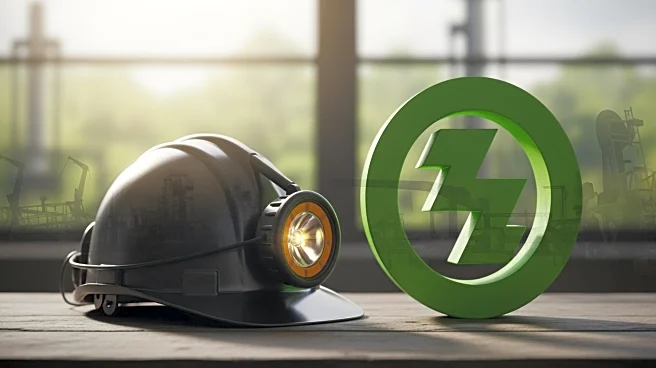What's Happening?
In Brazil, the coal industry is facing scrutiny as the country continues to expand its renewable energy capabilities. Despite Brazil's significant reliance on renewable sources, coal plants like the Candiota
facility remain operational, producing 3% of the nation's electricity. The plant's owner, Ambar, has invested heavily to keep it running, citing the reliability of coal in ensuring energy supply. However, environmental groups and critics argue that the continued use of coal undermines efforts to transition to cleaner energy sources. The Brazilian government has recently made coal eligible for a capacity auction, aiming to boost energy security, but this decision has surprised experts who question coal's flexibility compared to renewables.
Why It's Important?
The persistence of coal in Brazil's energy mix highlights the complex interplay between economic interests and environmental goals. While Brazil is a leader in renewable energy, the coal industry remains influential, particularly in regions where it provides significant employment. The government's support for coal through contracts and auctions reflects the challenges of balancing energy security with environmental sustainability. This situation underscores the need for comprehensive transition plans that address the economic impact on communities reliant on coal. The outcome of Brazil's energy policies could influence global discussions on fossil fuel dependency and climate change mitigation.
What's Next?
Brazil's government faces pressure to develop a clear transition plan for coal-dependent regions like Candiota. As the country hosts the United Nations climate summit COP30, there will be increased scrutiny on its energy policies and commitments to reducing fossil fuel use. The potential veto of the bill granting contracts to coal plants until 2040 by President Lula could signal a shift towards more aggressive renewable energy adoption. Stakeholders, including environmental groups and industry leaders, will be closely monitoring these developments and advocating for policies that support a just transition for affected workers and communities.
Beyond the Headlines
The debate over coal in Brazil reflects broader global challenges in transitioning to renewable energy. It raises ethical questions about the responsibility of governments to support communities economically dependent on fossil fuels while addressing climate change. The situation in Candiota illustrates the need for inclusive policies that consider social and economic dimensions alongside environmental goals. As Brazil navigates its energy future, the lessons learned could inform international strategies for achieving sustainable development and reducing carbon emissions.










